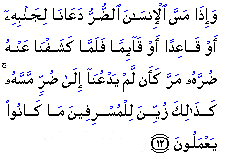Yunus
(Jonah)
Chapter 10: Verse 12
 Good and Bad Times Good and Bad Times
"And (such is a man that) when an affliction (difficulty) befalls him, he cries out to Us, reclining and sitting and standing. But no sooner than We have removed his affliction, he carries on as if he had never cried out to Us to remove his affliction. Thus this is the way the misdeeds of the transgressors are made fair-seeming to them."
The prolonged and severe famine which had virtually destroyed the people of Makkah, had ended just a little before the revelation of this verse. The famine was so acute that at one stage Abu Sufyan had approached the Prophet, peace be upon him, with a request to ask Allah to deliver them from this hardship. However, no sooner had the famine ended and heavy rains brought about a rich harvest and prosperity than the Makkans reverted to their old evil habits and to their hostile machinations against Islam.
Many Muslim youth crowd into the Masjid before exams, imploring Allah to give them good grades. But as soon as the exams are over and the marks are out, they go back to their old ways of missing their prayers and disobeying Allah in many ways. Similarly others turn to Allah only when they are faced with calamities, like family conflicts, financial and career stress, divorce, death of the loved ones...etc. But as soon as Allah solves their problems they return to their old ways.
We should worship Allah in our bad AND good times. During our bad times we should ask for His help and in our good times we should thank Him for His blessings. Those who worship Allah only during their bad times are termed as 'transgressors' in this verse.
Compiled
From:
"Towards Understanding the Quran", by S. Abul Ala Maududi, vol. IV |